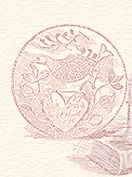Ihr liewe Leit:
Mer mache heit weider middem Moore seim Gedicht, “Die Schadde uff
der Grick.” Mer suche englische Wadde, gell?
So mancher macht mer Freede,
Un mancer dutt mer weh,
En mancher glingt as wie en Lied
Vumme Schadde ass ich seh.
Er schwebt datt uff de Welle,
Er sinkt datt in die Grick;
Der schtrom, der draagt des Bild mir fatt
Un losst mei Schmatz zerrick.
Wie watt es mol mit mir dann geh,
Wann ich aa nimmi bin,
Wann ich muss heemwatts wandre
Ins Schaddeland weit hin?
Watt aa mei Bild so schwewe,
Dann versinke auseem Blick?
Der Dot, der dann mei Schmatz fattnemmt,
Losst aer mei Lied zerrick?
Nau deet ich gaern wisse wieviel
englische Wadde ihr gude Leit gfunne hem. Habt ihr im Ziegler seim Gedicht
englische wadde gfunne? Nee, ich glaab net! Im Moore seim Schtick? Ya,
nadierlich, es Watt Grick, awwer Bach, es Deitsch Watt fer “creek” lest mer un
heert mer schiergaar nie, un viel PD deede saage ass es watt Schtrom (E
stream) so gut wie nie benutzt watt. Der Moore hot awwer en hochdeitsch Watt
benutzt! Blieb iss hochdeitsch fer iss gebliwwe, zu viel Wadde fer die Linye,
in der Takt waer widder gans letz.
Awwer habt ihr des Watt End im Ziegler seim Gedicht gsehne? Un
Moore hot sinkt benutzt. Der Brunner (8/19/04) hot Land, Hand, Mann, Summer,
Sunn, un Haus benutzt. Die Grohsin (8/26/04,9/02/04) hot Eis, Winder, un bring
benutzt. Sin die Wadde net englische Wadde? Nee, gaar net! Ya, ich weess, mer
kennt saage ass Land un Hand graad wie E aussehne, un Haus un Eis graad wie E
“house” un “ice” ausgschproche warre. Wann die sie net es englisches Watt
‘bring” am yuuse (sell iss widder en englisches Watt ass mer efders heert un
lest). Nee, sie schreibt es deitsch Watt bring!
Ya, sell iss gewiss waahr, weil Deitsch un Englisch verwande
Schprooche sin. Un so sin Haus un “house” verwande wadde. Es Englsche Watt
devor iss “cognate” Eis un “ice” sin “cognates,” deede sie Englische saage.
Un die Pennsylvaanisch Deitsche? Ya, sie kimmere sich gaar net do
drum. Sie schwetze eefach ihre Mudderschprooch.
Un sell iss alles was mer wisse muss!
Macht’s gut,
Der Alt Professer
|
Dear people:
We will today continue with Moore’s poem, “The Shadows on the
Creek.” We are looking for English words, right?
Some (of my thoughts) give me joy,
And some hurt me,
Many a one sounds like a song
Of a shadow that I see.
It hovers there on the waves,
It sinks there in the creek;
The stream, it carries away the picture
And leaves my pain behind.
How will it at sometime go with me,
When I too am no longer,
When I have to wander homewards
Into the land of shadows far away?
Will my picture also hover thus,
Then sink away from view?
Death, which will then take away my pain,
Will it leave my song behind?
Now I would like to know how many E words you good readers found.
Did you find E words in Ziegler’s poem? No, I don’t thinks so! In Moore’s
piece? Yes, naturally, the word Grick, but Bach, the German word for
“creek” is read and heard almost never, and many PGs would say that the
word Schtrom (E steam) is used so good as never. But Moore used a standard
German word! Blieb is standard German for iss gebliwwe (E has stayed), too
many words for the line, and one again the meter would be all wrong.
But did you see the word End in Ziegler’s poem? And Moore used
sinkt. Brunner (8/19/04) used Land, Hand, Mann, Summer, Sunn, Haus. Groh
(8-26-04, 9/02/04) used Eis, Winder, bring. Are not these words English?
No, not at all! Yes, I know, you could say that Land, Hand look just like
English, and Haus, Eis are pronounced just like E “house” and “ice”. When
Mrs. Groh used bring in her poem (9/02/04), is she not using (yuuse is
another E word that you hear and read quite often) the E word “bring”? No,
she is writing the PG word bring!
Yes, that is certainly true, because PG and English are “related
languages” or “kindred languages” The English word for this is “cognate”.
Eis and “ice” are cognates, the English (actually, the PG word refers to
anyone who is not PG!) would say.
And the Pennsylvania Germans? Yes, they don’t bother themselves
about that at all. They simply speak their Mother Tongue.
And that’s all one has to know!
Take care,
The Old Professor
|













